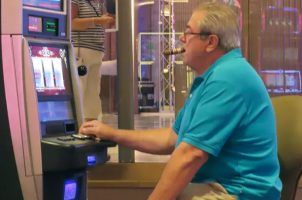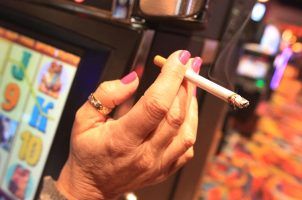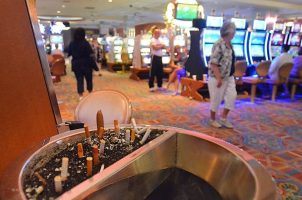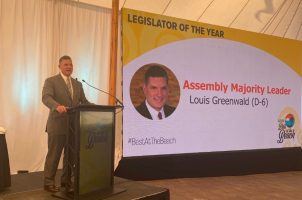New Jersey Gov. Murphy Says Both Sides of Casino Smoking Debate Must Be Considered
Posted on: April 29, 2024, 10:36h.
Last updated on: April 29, 2024, 10:46h.
New Jersey Gov. Phil Murphy (D) has said repeatedly that he would sign legislation to close the indoor smoking loophole afforded to casinos in Atlantic City through the state’s 2006 Smoke-Free Air Act. But the second-term governor said during his monthly radio program “Ask Governor Murphy” on New Jersey Public Radio that both sides of the controversy should be considered fully.

Pressed by a caller about the lawsuit recently filed by the United Auto Workers, the union that represents table game dealers at Bally’s, Caesars, and Tropicana, challenging the state’s allowance of smoking inside casinos, Murphy said there are two sides to the matter. The governor stressed his belief that the issue would be best settled out of court through legislative action.
The [UAW] argument is folks are smoking and blowing it right in [dealers’] faces. I get that,” Murphy said. “On the other side, the other big union, Local 54 of Unite Here, does not want [smoking] banned because they’re concerned it will impact the business prospects in Atlantic City.”
Unite Here’s local chapter represents nongaming casino resort workers, including housekeepers, chefs, waitstaff, bellhops, and porters. Murphy nonetheless says if a bill reaches his desk that remedies the controversy, he will sign it.
“I will reiterate — if a bill gets to my desk, subject obviously to the details, I will sign it,” the governor committed.
CEASE Fires Back
CEASE took issue with Murphy recognizing the side that wants to continue allowing indoor casino smoking. The casino workers group, which includes those table game dealers who must endure secondhand smoke daily, argues that their health should outweigh the financial bottom lines of multibillion-dollar corporations.
There are not two equal sides in this fight,” said Pete Naccarelli, co-founder of CEASE. “Gov. Murphy should stop giving credence to casino industry scare tactics powered by alternative facts they manufactured through a report they bought and paid for.”
Naccarelli was referencing a study commissioned by the Casino Association of New Jersey published in 2022 that concluded a smoking ban could cost 2,500 casino jobs and an 11% reduction in annual gross gaming revenue in Atlantic City. Independent research firm Spectrum Gaming conducted the report but CEASE argued it was performed with a bias.
CEASE thinks a smoking ban would improve business in Atlantic City. The organization cited a 2022 study from C3 Gaming that found “data from multiple jurisdictions clearly indicates that banning smoking no longer causes a dramatic drop in gaming revenue.”
“In fact, non-smoking properties appear to be performing better than their counterparts that continue to allow smoking,” the study concluded.
Legal Challenge
UAW is representing the interests of a grassroots organization called Casino Employees Against Smoking’s Effects (CEASE). The litigation is seeking a court to declare the New Jersey clean indoor air exemption for gaming facilities unconstitutional.
“The lawyers with whom I’ve spoken have said this gets fixed by statute — not in the court,” Murphy said Friday. UAW disagrees.
If the legislators in Trenton won’t do their jobs, we’re going to take the decision out of their hands and into the courtroom,” UAW Regional Assistant Director Ray Jensen Jr. declared.
Legislation proposing amendments to the 2006 smoking law continues to linger in Trenton without action. Competing bills are seeking to eliminate indoor smoking while another proposes fully enclosed smoking spaces on the casino floors where casinos wouldn’t be allowed to force an employee to work.
Related News Articles
Atlantic City Casino Smoking Ban May Be Considered After Election
Atlantic City Casino Smoking Legislation Set for Senate Committee Hearing
Atlantic City Casinos Seemingly Win Smoking Fight, At Least for Now
Big Tobacco Tied to New Jersey Assembly Smoking Debate Leader
Most Popular
Mirage Las Vegas Demolition to Start Next Week, Atrium a Goner
Where All the Mirage Relics Will Go
Most Commented
-
Bally’s Facing Five Months of Daily Demolition for Chicago Casino
— June 18, 2024 — 12 Comments -
Chicago Pension Mess Highlights Need for Bally’s Casino
— July 2, 2024 — 5 Comments
















Last Comment ( 1 )
For years Murphy said he would sign a bill if it got to his desk. Now all of a sudden, when a big union is involved, which means votes, he is waffling. Both sides? Sounds a lot like Trump's language following Charlottesville!